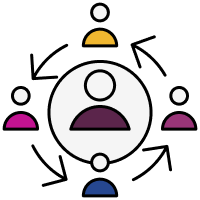Degree in neuromanagement and brain leadership
300 hours | Online

Introduction
The Degree in neuromanagement and brain leadership is designed to train leaders, executives, and consultants in the application of neuroscience knowledge to leadership, decision-making, motivation, and talent management.
The program offers an evidence-based approach that enables the transformation of work environments and the development of a high-performance organizational culture.
It is aimed at executives, HR managers, coaches, organizational psychologists, as well as professionals in education, consulting, or occupational health who wish to lead teams in digital or cultural transformation processes.
Objective
To train leaders, executives, and consultants in the use of neuroscience applied to leadership, decision-making, motivation, and talent management, with an evidence-based approach to transforming work environments.
Methodology
Curriculum
Fundamentals of neuroscience for management (40 h)
Emotional management and the social brain (40 h)
Change management and mental agility (40 h)
Applied neuromanagement project (40 h)
Neuroscience of leadership and decision-making (50 h)
Neuromotivation and engagement (40 h)
Neuromanagement of teams and organizational culture (50 h)
Fundamentals of neuroscience for management (40 h)
Neuroscience of leadership and decision-making (50 h)
Emotional management and the social brain (40 h)
Neuromotivation and engagement (40 h)
Change management and mental agility (40 h)
Neuromanagement of teams and organizational culture (50 h)
Applied neuromanagement project (40 h)
Participant profile
This program is aimed at executives, HR managers, coaches, and organizational psychologists, as well as professionals in education, consulting, or occupational health. It is also ideal for team leaders seeking to strengthen the digital and cultural transformation of their organizations.


